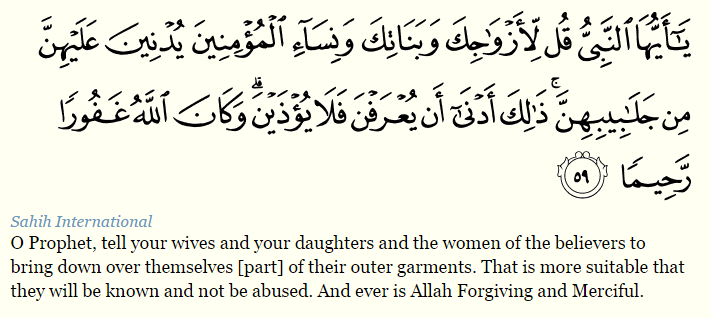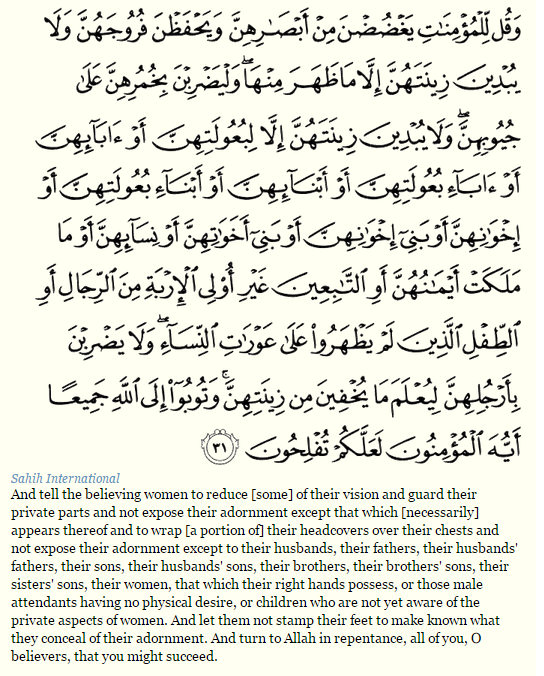The Qur`an does not specify that women must cover their hair. It merely says that they have to preserve their 'beautiness' (e.g. ornaments). Wearing hijab was a norm prior to the spread of Islam and was common all over the world in many cultures. The other cultures gradually abandoned it but our culture still holds on to it. Many Arabs are conservative and still attached to their old culture and tradition, that's why they interpret it in that way. Why women should wear hijab if I can interpret what Qur`an says in a different way than conservative Arabs (not about religion but about culture) do?
-
Jule your questions are always nice but I dont think you ask questions to get answers as you dont participate in communications later on... (I know you well). By the way could you refer us to that Ayyah so that it would produce ease for us... And we could guide you well..– Rehan UllahCommented Aug 5, 2015 at 10:01
-
Yeah sorry, It's just that I just signed up, and now I can comment easily, but before I asked my questions as a guest, and often I coudn't comment because the site would not recognise me as the one who posted the question.– JuleCommented Aug 5, 2015 at 10:17
-
okay then Jule tick green the answer which you like(not immediately but wait for about 12 or 24 hours to get nicer answers). Did you know accepted answers increment rating of a stack overflow site and one day will take us out from the beta stage!! Have nice overflowing!!!– Rehan UllahCommented Aug 5, 2015 at 10:24
2 Answers
Thank you for your question, it is so very clear that the Quran does not allow women to show their hair(particularly), it does not allow them to show teir entire body(exept face and hands), and here are some references from the holly Quran itself which forbid women to go out witthout their hijab, i hope it will help you change your idea.
(Al-Ahzab 33:59)
(An-Nur 24:31)
A refrence from the Hadiths
1 – It was narrated from Safiyyah bint Shaybah that ‘Aa’ishah (may Allaah be pleased with her) used to say: When these words were revealed – “and to draw their veils all over Juyoobihinna (i.e. their bodies, faces, necks and bosoms)” – they took their izaars (a kind of garment) and tore them from the edges and covered their faces with them.
Narrated by al-Bukhaari, 4481
-
1Very nice answer! Keep it up. It would be even nicer if you could add some references from Hadith!! Commented Aug 5, 2015 at 10:28
Two verses may be considered relevant to your question:
As far as 33:59 is concerned, it deals with a specific situation that arouse in Medina and prescribes a measure so that the modest women are "recognized and not harmed" by "those who affront believing men and believing women". The measure was to "draw over themselves some of their outer garments".
This context implies that the directives given in these verses are applicable in similar situations.
This leaves us with 24:31 which is a general directive as clear from "that is purer for them" in the preceding verse. Moral purity is the ultimate aim if one wants to enter paradise (87:14) and, therefore, desired in every situation.
You have referred to the following part of the verse in your question:
[say to believing women] not to reveal their adornments - save what is normally apparent thereof
However, I believe the part of the verse relevant to your question is:
and they should fold their 'khumur' (singular: khimar) over their bosoms
I shall just try to explain the cause of different interpretations:
- Some scholars would argue that things that are understood need not to be mentioned explicitly in any conversation or discourse. (We, too, experience this in our daily lives) They would say that the khimar was being used to cover head (hair) at the time of revelation. However, the ladies were careless in covering their bosoms. Therefore, the Qur`an assuming their then current state ordered them to cover their bosoms too.
- Others would argue that the imperative is on covering the bosoms. Therefore, covering head (hair) does not constitute an essential part of the Islamic Shariah.
At the end, I would say that any of the aforementioned opinions if adopted through honest quest and practiced in letter and spirit would save us from His displeasure, in sha`a Allah.


